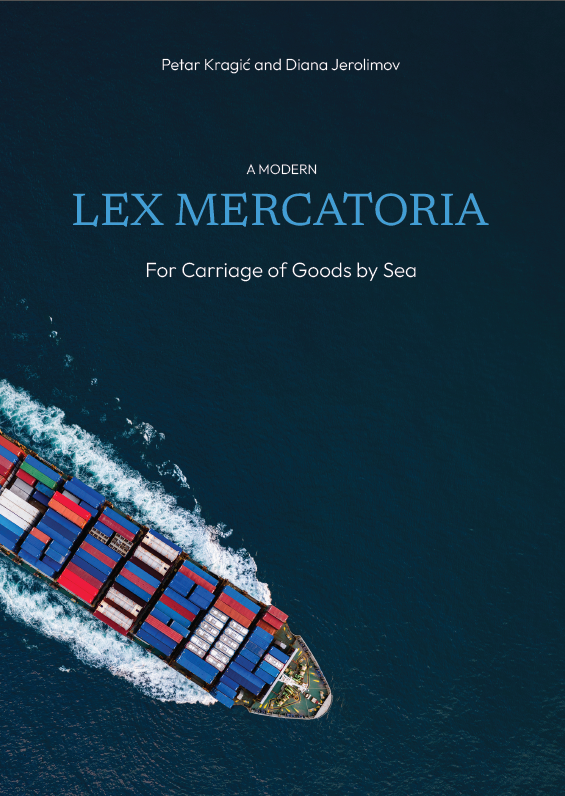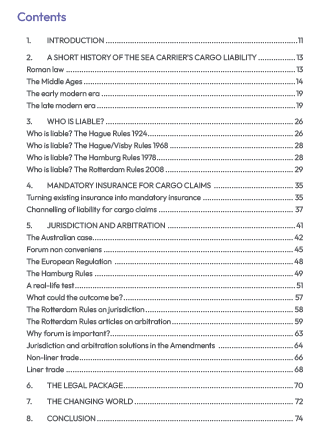NEW BOOK with NEW IDEAS
THE KEY POINTS:
- Carriage of goods by sea industry requires uniform liability regime, elaborate applicable law and impartial / expert tribunals for dispute resolution.
- This is reflected in the charter parties’ law and jurisdiction clauses, where ship-owners and charterers agree on jurisdiction and law, which – as a rule – have nothing to do with their nationalities or countries involved with the ship’s voyage.
- However, in many countries the jurisdiction and law clauses incorporated in the bills of ladings do not bind the receivers, which sue the carrier in the local courts that might favour their claims, or apply substandard criteria in assessing the evidence or ignore legal concepts that are expected to be part of the governing law, such as duty to mitigate damage, misrepresentation and alike.
- The ship-owners in tramp trade and in the liner trade when volume contracts are concerned have lost their monopolistic upper hand that instigated the Harter Act 130 years ago, and continue to inspire all international conventions ever since – The Hague Rules, The Hague/Visby Rules, The Hamburg Rules and The Rotterdam Rules.
- Therefore, the idea is to recognise the law and jurisdiction clause, save in the liner trade for smaller shippers that have no power to oppose to the law and jurisdiction clauses that call for exclusive jurisdiction and law of the court of the carrier’s principal place of business.
- The Rotterdam Rules introduced the concept of the performing party that grants the cargo interest right to sue any party down the service chain that “performs or undertakes to perform any of the carrier’s obligations”. The idea behind that concept is to make available to the cargo claimants as much assets as possible in order to secure to a higher-level reimbursement of their claims. The consequence of such approach is annihilation of the basic principle of privity of contracts. There is no wonder that states in US with large sea ports oppose to ratification of the Rotterdam Rules, and that a great deal of the shipping and insurance industry see the mammoth and complicated Rotterdam Rules more as a problem than solution and a vast source of litigations.
- The book suggests that the performing party concept should be replaced by mandatory insurance of the carrier’s cargo liability, but proposes that – instead of the direct action against the liability insurer (contained in other conventions prescribing the mandatory insurance) – the enforcement action be introduced. The proposed enforcement action would emulate the position of the liability insurer when it issues a letter of guarantee to the claimant in order to lift the arrest of the ship. The claimant would have first to obtain the final judgment of a competent court (or a negotiated amicable settlement) and would get the right to sue the liability insurer only if the final and un-appealable judgment against the carrier is not paid within the temporis judicati (same as the standard P&I LOU).
- As a rule, all the ships in the international trade have for multiply reasons P&I cover (that include insurance for cargo liability) – charterers require evidence of ship’s P&I cover as a condition to charter her in; number of maritime conventions prescribe compulsory liability insurance and require evidence of such cover; EU Directive calls for mandatory insurance for maritime claims; IMO Guidelines on Shipowners’ Responsibility recommend to the ship-owners taking out liability insurance in respect of maritime claims.
- IN CONCLUSION the parties should be allowed to choose law and jurisdiction that will bind the bill of lading holder as well (unless it is a party to a single voyage contract in liner trade not in position to oppose law and jurisdiction clauses imposed by the carrier calling for law and jurisdiction of the court in carrier’s place of business). The third parties – not privy to the contract of carriage – will be liable to the counterparties of their respective service contracts according to particular service contracts’ terms; tort action will be banned and liability channelled towards the carrier. Cargo interests will be protected by the carrier’s mandatory liability insurance that will grant an enforcement action to the claimant that obtained a final and un- appealable judgment or negotiated settlement for damages The liability insurers will be in the same position as they are today save that the claimant would not have to arrest the ship in order to obtain security (letter of undertaking / bank guarantee), but will have the right to sue the insurer for enforcement of a final and un- appealable judgment of the competent court obtained against the carrier in case the judgment is not honoured within the temporis iudicati.



